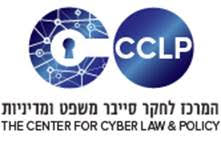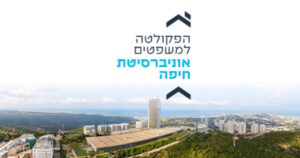Cyber Challenges to International Human Rights
International Conference
A collaboration of the Center for Cyber, Law and Policy (CCLP), University of Haifa & the Cyber Law Program, International Cyber Security Research Center, Hebrew University of Jerusalem
Day 1
When: December 11, 2017
Where: The Hebrew University in Jerusalem
The Israel Institute for Advanced Studies (IIAS) of Jerusalem
Edmond J. Safra, Givat Ram Campus,Feldman Building, Room 130
In recent years, the digital ecosystem has become an arena for hostile cyber activities on the part of states, terror organizations and independent or semi-independent hackers, affecting the interests of individuals, organizations and states. At the same, powerful public and private entities are able to exercise broad powers of surveillance, information collection and manipulation of software and hardware, and can utilize such powers for nefarious ends. This emerging scene, which is under-regulated, creates new threats to civil liberties and human rights. Can existing international law and domestic law instruments and institutions sufficiently address the new threats to civil liberties and human rights?
This conference aims to bring together an international group of established and young scholars who are studying cybersecurity and its ramifications for civil liberties and human rights. The conference will offer an opportunity to present cutting-edge research addressing these issues, to introduce new projects and thought-provoking initiatives, and to promote exchange among participants that will inform their ongoing research.
Keynote speakers:
Prof. Michael N. Schmitt
Michael N. Schmitt is a Professor of Public International Law at Exeter Law School, the Charles H. Stockton Professor at the United States Naval War College and Francis Lieber Distinguished Scholar at the Lieber Institute of the United States Military Academy at West Point. He is also a Senior Fellow at the NATO Cyber Defence Centre of Excellence, Senior Research Associate at Hebrew University, Affiliate at Harvard’s Program on International Law and Armed Conflict, and General Editor of International Law Studies and the Lieber Studies series (OUP). Professor Schmitt was previously Professor of International Law at Durham University, Dean of the George C. Marshall European Center for Security Studies in Germany, and General Editor of the Yearbook of International Humanitarian Law. Before joining the Marshall Center, Professor Schmitt served 20 years in the United States Air Force as a judge advocate specializing in operational and international law.
Professor Schmitt serves on many boards of institutions, learned and professional societies, and publications dealing with international law. The author of over 150 scholarly publications, his academic degrees include a D.Litt (Durham University), JD (University of Texas), LL.M (Yale University), MA (Naval War College), and MA (Texas State University). He is a life member of the Council on Foreign Relations and a Fellow of the Royal Society of the Arts. Also a member of the Secretary of State’s Advisory Committee on International Law, in 2017 he was awarded the Order of the Cross of Terra Mariana by the President of Estonia for his work in promoting cyber defense.
Prof. Arun Chinmayi
Chinmayi Arun is the Research Director of the Centre for Communication Governance at National Law University Delhi, where she is also an Assistant Professor of Law. She is a member of the Indian Government’s multi stakeholder advisory group for the India Internet Governance Forum and one of the academic experts for the Internet & Jurisdiction Project’s Observatory. She has also been a consultant to the Law Commission of India.
Chinmayi has published academic papers on surveillance and the right to privacy in India, and on information gatekeeper liability in the context of internet intermediaries. She is lead author of the India country report in Freedom House’s Freedom on the Net report and the India report in the Global Network of Centres’ study of online intermediaries which was led by the Berkman Centre at Harvard Law School.
She has been invited to discuss her work at academic institutions like Oxford University and Harvard University, as well as at fora convened by international bodies like UNESCO. In an effort to make sure that her work is accessible and has impact, Chinmayi has participated and supported the government delegation in events such as the World Conference on International Telecommunications. She designed and is building an online information policy teaching and learning resource.
Chinmayi has studied at the NALSAR University of Law, and London School of Economics and Political Science. At the LSE, she read regulatory theory and new media regulation, and was awarded the Bernard Levin Award for Student Journalism. She has worked with Ernst & Young and AZB & Partners, Mumbai in the past, and has taught at the West Bengal National University of Juridical Sciences where she introduced courses on regulatory theory and communication regulation. She teaches seminar courses on Internet Governance at National Law University Delhi.
Agenda
8:15-8:45 Welcome and Coffee
8:45-9:00 Opening Remarks
- Yuval Shany, Hebrew University of Jerusalem
- Niva Elkin-Koren, University of Haifa, Faculty of Law
- Amit Ashkenazi, Legal Advisor, National Cyber Directorate
9:00-10:30 Keynote: Michael N. Schmitt, Exeter Law School
Grey areas in the law of cyberspace
10:30-10:45 Coffee Break
10:45-12:15 Web Access as a Human Right
Moderator: Tehilla Shwartz-Altshuler, Hebrew University of Jerusalem
- Antal Berkes, University of Manchester, School of Law
The Territorial State’s Responsibility for the “Information Blockade” in
Areas out of its Effective Control – Restoring “Internet Sovereignty”?
- Deborah Housen-Couriel, Hebrew University of Jerusalem
Blocking of Cyber-Enabled Communications by States: Ramifications
for the Right to Freedom of Communication
- Ryan Shandler, University of Haifa
Internet Access as an Auxiliary Human Right
12:15-13:15 Lunch talk
Aviv Zohar, Hebrew University of Jerusalem
The Crypto Anarchist Manifesto
13:15-14:45 Keynote: Chinmayi Arun, National Law University Delhi
Artificial Intelligence, Algorithms and Speech: Setting Standards for the New World
14:45-16:15 Active Cyber-Defense and Predictive Policing
Moderator: Tamar Berenblum, Hebrew University of Jerusalem
- Arturo Carrillo, George Washington University Law School
Cybersecurity and Interpersonal Cyber-Violence (ICV)
- Shavana Musa, The University of Manchester, UK
The State, Active Defence and Human Rights
- Simon Perry, Hebrew University of Jerusalem
Reducing false-identifications and failure to identify of radicals
on new social media: A comparative analysis of violent and
non-violent radicals and human rights implications
16:15-16:30 Coffee Break
16:30-18:00 Non-State Actors and Freedom of Expression
Moderator: Barak Medina, Hebrew University of Jerusalem
- Oleg Soldatov, Università Commerciale Luigi Bocconi
“Bloggers Law” and Online Freedom of Expression in Russia
- Themis Tzimas, University of Macedonia, in Thessaloniki, Greece
An e- right to whistleblowing or hacking? State- sovereignty and
political rights in the age of the cyber-space
- Tomer Shadmy, Tel Aviv University
Human Rights by design: Do internet Giants Lock-in our Legal Imaginary
- Urbano Reviglio, University of Bologna
“Serendipity by Design”: Value Sensitive Design (VSD) Approach
18:00-19:30 The State in an Era of Weaponized Information
Moderator: Noam Lubell, University of Essex
- Ido Kilovaty, Yale Law School
Doxfare – Politically Motivated Leaks and the Future of The Norm
on Non-Intervention and the Right to Self-Determination
- Ido Rosenzweig and Amnon Reichman, University of Haifa
State Operated Hackings: Human Rights in the Cyber Era

